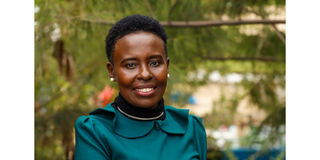Towards gender-responsive security: How new programme is facilitating safety for all in Kenya
Sponsored content

Jaki Mbogo, Tetra Tech International Development.
By Jaki Mbogo
Insecurity manifests in diverse forms, with devastating results. From violence against women and girls to violent extremism, communal, and gang-related violence, its impact reverberates throughout society, undermining progress towards inclusive growth and investment.
In Kenya, as in many other nations, insecurity disproportionately affects women and girls, deepening existing inequalities and impeding their advancement.
Article 29 of the Constitution, defines security as a fundamental right of every citizen, regardless of gender. The government, through its national security organs, is entrusted with the responsibility to ensure that all individuals enjoy the rights and freedoms enshrined therein, including the right to security. At the forefront of this crucial mandate stands the National Police Service (NPS), tasked with formulating and executing safety and security approaches that should, among others, cater for the distinct needs of women amidst the backdrop of crime, violence, or instability.
Traditionally, security services often fail to consider gender dynamics in their approaches to security interventions. For example, during security operations, the deployment of resources and personnel should be designed to account for the specific vulnerabilities of women, girls, persons with disabilities, and the elderly, who may be adversely affected by these interventions. When such considerations are overlooked, it perpetuates a cycle of insecurity that disproportionately impacts these groups of the population.
NPS gender policy
Despite these challenges, efforts are being made towards ensuring that the provision of safety and security services is responsive to the distinct needs of both women and men, at every stage of their lives, from childhood to old age. One such effort is the development of the NPS gender policy, which was done more than three years ago, though it still awaits the internal organs’ final approval and launch thereof. If this is operationalized, it will help to institutionalise gender responsiveness as a standard practice within the security sector.
Similarly, the REINVENT programme, that works to promote community security and stability in 18 counties across Kenya, with funding from the British High Commission in Nairobi, has played a pivotal role in supporting the NPS to develop guidelines on the effective operation of gender desks. These are being used to strengthen about 60 gender desks across various police stations – in the Coastal region, Western, Upper Eastern, and the North East.
Gender desks
The desks serve as crucial platforms for adopting survivor-centred approaches, particularly in cases of sexual and gender-based violence (SGBV). Through these gender desks, survivors of SGBV can access support services in a secure and confidential environment, including counselling and referrals to relevant support services within the GBV referral chain. By prioritising the needs and experiences of survivors, these initiatives aim to break the silence surrounding SGBV and empower more victims to seek justice.
POLICARE
Another significant stride is the inception of POLICARE, a comprehensive one-stop centre for SGBV services spearheaded by the police.
POLICARE signifies a paradigm shift in law enforcement agencies' response to violence against women and girls (VAWG). By consolidating support services under one roof, it streamlines the process for survivors, ensuring they receive prompt and coordinated assistance.
Building on the previous Jamii Thabiti initiative that provided technical assistance to the NPS for the development of its Standard Operating Procedures (SOPs) for the prevention and response to sexual and gender based violence, REINVENT also supported the development of a policy, strategy and SOPs for the POLICARE, a one-stop centre for SGBV management. These are now in the process of being integrated in the NPS Service Standing Orders (SSOs).
The programme will continue its support towards the implementation of a comprehensive training for police officers on gender-sensitive survivor handling techniques, recognising SGBV indicators, and responding sensitively to survivors' needs. By ingraining gender responsiveness into the very essence of policing, these initiatives aim to revolutionise how law enforcement agencies engage with and safeguard vulnerable populations.
At county and devolved units, REINVENT supports initiatives aimed at advocating for national and county governments to prioritise gender considerations within their development strategies.
Ksh245 million
In the fiscal year 2023/2024, the National Government proposed to allocate Ksh245 million to bolster prevention and response to SGBV. It is envisaged that a portion of these resources will be earmarked to support security agencies in integrating gender-sensitive practices into their security approaches. This includes expanding and reinforcing gender desks and implementing the POLICARE approach at all police service delivery points nationwide.
The significance of gender-responsive policing transcends individual cases of violence or insecurity. It is a cornerstone of building a more inclusive and equitable society. By acknowledging and addressing the unique vulnerabilities faced by women and girls, law enforcement agencies can play a pivotal role in broader efforts to promote gender equality and social justice.
In conclusion, gender-responsive policing is indispensable for ensuring equality and safety for all individuals in Kenya. By prioritising the specific needs and experiences of women and girls in security interventions and service delivery, the nation can progress towards its aspirations of inclusive growth and investment, while upholding fundamental rights and freedoms for all.
Through collaborative endeavours between government agencies, civil society organisations, and other players, Kenya can secure a safer and more inclusive future for all its citizens.
_______________
The writer is the Chief of Party, REINVENT Programme, Tetra Tech International Development. The programme is funded by the British High Commission Nairobi and works to promote community security and stability in 18 counties across Kenya


